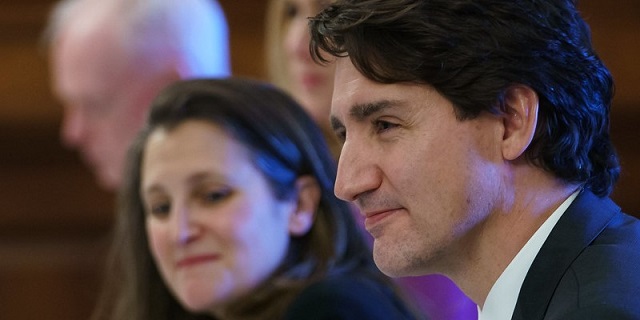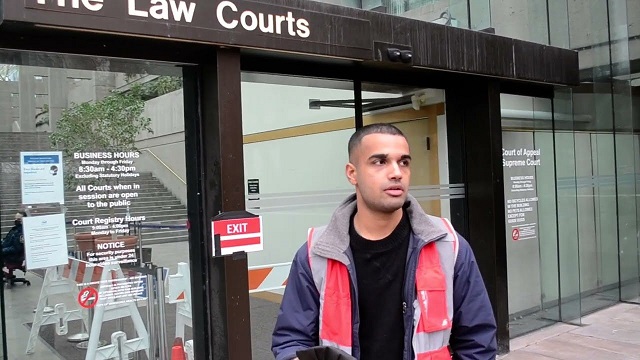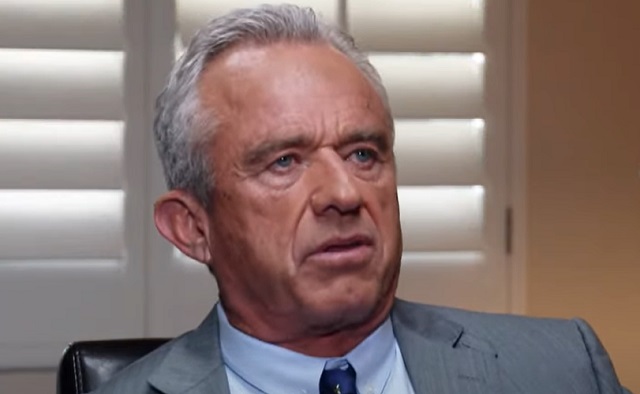Business
Federal government poised to pile on more spending and debt

From the Fraser Institute
Next week, the Trudeau government will release its fall fiscal update, which, considering the sorry state of federal finances, should demonstrate a newfound approach to spending and borrowing. But don’t hold your breath.
Although the Trudeau government describes itself as “fiscally responsible,” in reality it has a track record of unrestrained spending and large budget deficits. And it’s overseen the five highest years (2018 to 2022) of per-person program spending (adjusted for inflation) in Canadian history. Even excluding COVID-related spending, 2020 and 2021 remain the two highest years of per-person spending on record.
The Trudeau government has also run deficits every year since it took office in 2015—according to forecasts, this year’s deficit will eclipse $40 billion even though COVID is in the rearview mirror. Consequently, federal debt will have increased nearly $900 billion since 2014/15, up to $1.9 trillion for 2023/24.
While the prime minister and Finance Minister Chrystia Freeland often downplay the level of debt accumulation by noting that Canada has the lowest net debt-to-GDP ratio among the G7 countries (Germany, Italy, Japan, France, the United Kingdom and the United States), this is misleading.
Net debt is calculated as total (gross) debt minus all financial assets, with the implicit assumption that those assets could be used to offset debt. However, the Canada and Quebec Pension Plans (CPP and QPP) are included in the financial assets used to calculate net debt in Canada. But because CPP/QPP assets are needed for existing and future retirees, in reality they can’t be used to offset government debt.
Therefore, a better measure is gross debt, which measures all liabilities that require future payment of interest and/or principal by the debtor to the creditor. Compared to 29 other advanced economies, including the G7 countries, Canada’s gross debt as a share of the economy ranks 20th—meaning Canada is among the most indebted countries.
Clearly, the Trudeau government has been anything but fiscally responsible. And the current levels of spending and borrowing impose real costs on Canadians.
For example, since 2014/15 federal government debt interest costs have nearly doubled—reaching an estimated $43.9 billion, or 9.6 per cent of total revenues, for 2023/24. This means roughly one in every 10 dollars Ottawa collects from Canadian taxpayers this year will go towards debt interest costs, rather than government services or tax relief.
In light of these fiscal realities, if the Trudeau government wants to move anywhere close to a balanced budget in the foreseeable future, it must take meaningful steps in the upcoming fall fiscal update to restrain spending growth.
Unfortunately, this is unlikely to happen.
In a recent report, the Parliamentary Budget Officer (PBO) estimated that, due to spending increases, the federal government will run a deficit of $46.5 billion for 2023/24—$6.4 billion more than the government’s budget projections in March.
The government will also likely include new spending in the upcoming fiscal update meant to address housing and affordability. And will likely soon table legislation on national pharmacare, which the PBO estimates will cost $11.2 billion in 2024/25 alone.
Finally, not only does this unprecedented level of spending rack up mountains of debt, according to Bank of Canada Governor Tiff Macklem, “government spending is starting to get in the way of getting inflation back to target.” In other words, more spending by the federal government to address affordability concerns could actually worsen the problem by keeping inflation (and interest rates) higher than would otherwise be the case, eroding the purchasing power of Canadians.
While Ottawa’s fiscal situation demands a fiscally responsible fall fiscal update, it’s likely we’ll see much of the same next week from the Trudeau government—more spending and more borrowing.
Authors:
Business
Taxpayers criticize Trudeau and Ford for Honda deal

From the Canadian Taxpayers Federation
Author: Jay Goldberg
The Canadian Taxpayers Federation is criticizing the Trudeau and Ford governments to for giving $5 billion to the Honda Motor Company.
“The Trudeau and Ford governments are giving billions to yet another multinational corporation and leaving middle-class Canadians to pay for it,” said Jay Goldberg, CTF Ontario Director. “Prime Minister Justin Trudeau is sending small businesses bigger a bill with his capital gains tax hike and now he’s handing out billions more in corporate welfare to a huge multinational.
“This announcement is fundamentally unfair to taxpayers.”
The Trudeau government is giving Honda $2.5 billion. The Ford government announced an additional $2.5 billion subsidies for Honda.
The federal and provincial governments claim this new deal will create 1,000 new jobs, according to media reports. Even if that’s true, the handout will cost taxpayers $5 million per job. And according to Globe and Mail investigation, the government doesn’t even have a proper process in place to track whether promised jobs are actually created.
The Parliamentary Budget Officer has also called into question the government’s claims when it made similar multi-billion-dollar handouts to other multinational corporations.
“The break-even timeline for the $28.2 billion in production subsidies announced for Stellantis-LGES and Volkswagen is estimated to be 20 years, significantly longer than the government’s estimate of a payback within five years for Volkswagen,” wrote the Parliamentary Budget Officer said.
“If politicians want to grow the economy, they should cut taxes and red tape and cancel the corporate welfare,” said Franco Terrazzano, CTF Federal Director. “Just days ago, Trudeau said he wants the rich to pay more, so he should make rich multinational corporations pay for their own factories.”
Business
UN plastics plans are unscientific and unrealistic

News release from the Coalition of Concerned Manufacturers and Businesses of Canada
“We must focus on practical solutions and upgrading our recycling infrastructure, not ridiculous restrictions that will harm our health care system, sanitary food supply, increase costs and endanger Canadians’ safety, among other downsides.”
This week Ottawa welcomes 4,000 delegates from the United Nations to discuss how they will oversee a reduction and even possible elimination of plastics from our lives. The key problem is no one has ever figured out how they will replace this essential component of our modern economy and society. The Coalition of Concerned Manufacturers and Businesses of Canada (CCMBC) has launched an information campaign to discuss the realities of plastic, how it contributes massively to our society and the foolishness of those who think plastics can be eliminated or greatly reduced without creating serious problems for key industries such as health care, sanitary food provision, many essential consumer products and safety/protective equipment, among others. CCMBC President Catherine Swift said “The key goal should be to keep plastics in the economy and out of the environment, not eliminate many valuable and irreplaceable plastic items. The plastics and petrochemical industries represent about 300,000 jobs and tens of billions contribution to GDP in Canada, and are on a growth trend.”
The UN campaign to ban plastics to date has been thwarted by reality and facts. UN efforts to eliminate plastics began in 2017, motivated by such terrible images as rivers with massive amounts of floating plastic and animals suffering from negative effects of plastic materials. Although these images were dramatic and disturbing, they do not represent the big picture of what is really happening and do not take into account the many ways plastics are hugely positive elements of modern society. Swift added “Furthermore, Canada is not one of the problem countries with respect to plastics waste. Developing countries are the main culprits and any solution must involve helping the leading plastics polluters find workable solutions and better recycling technology and practices.”
The main goal of plastic is to preserve and protect. Can you imagine health care without sanitary, flexible, irreplaceable and recyclable plastic products? How would we keep our food fresh, clean and healthy without plastic wraps and packaging? Plastic replaces many heavier and less durable materials in so many consumer products too numerous to count. Plastics help the environment by reducing food waste, replacing heavier materials in automobiles and other products that make them more energy-efficient. Many plastics are infinitely recyclable and innovations are taking place to improve them constantly. What is also less known is that most of the replacements for plastics are more expensive and actually worse for the environment.
Swift stated “Environment Minister Steven Guilbeault has been convinced by the superficial arguments that plastics are always bad despite the facts. He has pursued a campaign against all plastics as a result, without factoring in the reality of the immense value of plastic products and that nothing can replace their many attributes. Fortunately, the Canadian Federal court overturned his absurd ban on a number of plastic products on the basis that it was unscientific, impractical and impinged upon provincial jurisdiction.” Sadly, Guilbeault and his Liberal cohorts plan to appeal this legal decision despite its common-sense conclusions. Opinion polls of Canadians show that a strong majority would prefer this government abandon its plastics crusade at this point, but history shows these Liberals prefer pursuing their unrealistic and costly ideologies instead of policies that Canadians support.
The bottom line is that plastics are an essential part of our modern society and opposition has been based on erroneous premises and ill-informed environmentalist claims. Swift concluded “Canada’s record on plastics is one of the best in the world. This doesn’t mean the status quo is sufficient, but we must focus on practical solutions and upgrading our recycling infrastructure, not ridiculous restrictions that will harm our health care system, sanitary food supply, increase costs and endanger Canadians’ safety, among other downsides.” The current Liberal government approach is one that has no basis in fact or science and emphasizes virtue-signaling over tangible and measurable results. Swift noted “The UN’s original founding purpose after World War II was to prevent another world war. Given our fractious international climate, they should stick to their original goal instead of promoting social justice warrior causes that are unhelpful and expensive.”
The CCMBC was formed in 2016 with a mandate to advocate for proactive and innovative policies that are conducive to manufacturing and business retention and safeguarding job growth in Canada.
SOURCE Coalition of Concerned Manufacturers and Businesses of Canada
-

 COVID-191 day ago
COVID-191 day agoPfizer reportedly withheld presence of cancer-linked DNA in COVID jabs from FDA, Health Canada
-

 Censorship Industrial Complex2 days ago
Censorship Industrial Complex2 days agoJordan Peterson, Canadian lawyer warn of ‘totalitarian’ impact of Trudeau’s ‘Online Harms’ bill
-

 Alberta2 days ago
Alberta2 days agoAlberta rejects unconstitutional cap on plastic production
-

 COVID-1916 hours ago
COVID-1916 hours agoTrudeau gov’t has paid out over $500k to employees denied COVID vaccine mandate exemptions
-

 Alberta2 days ago
Alberta2 days agoAlberta official reveals ‘almost all’ wildfires in province this year have been started by humans
-

 Bruce Dowbiggin2 days ago
Bruce Dowbiggin2 days agoCome For The Graduate Studies, Stay For The Revolution
-

 International15 hours ago
International15 hours agoRFK Jr tells EWTN: Politicization of the CIA, FBI, Secret Service under Biden is ‘very troubling’
-

 Alberta2 days ago
Alberta2 days agoPolitical parties will be part of municipal elections in Edmonton and Calgary pilot projects








